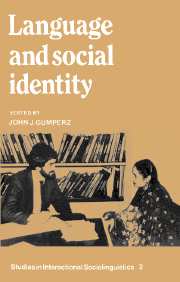Book contents
- Frontmatter
- Contents
- Preface
- A note on conventions
- 1 Introduction: language and the communication of social identity
- 2 Thematic structure and progression in discourse
- 3 Discovering connections
- 4 Inscrutability revisited
- 5 Negotiating interpretations in interethnic settings
- 6 Strategies and counterstrategies in the use of yes–no questions in discourse
- 7 Negotiations of language choice in Montreal
- 8 Performance and ethnic style in job interviews
- 9 Interethnic communication in committee negotiations
- 10 Fact and inference in courtroom testimony
- 11 A cultural approach to male–female miscommunication
- 12 Ethnic style in male–female conversation
- 13 Language and disadvantage: the hidden process
- Bibliography
- Subject index
- Author index
4 - Inscrutability revisited
Published online by Cambridge University Press: 24 November 2009
- Frontmatter
- Contents
- Preface
- A note on conventions
- 1 Introduction: language and the communication of social identity
- 2 Thematic structure and progression in discourse
- 3 Discovering connections
- 4 Inscrutability revisited
- 5 Negotiating interpretations in interethnic settings
- 6 Strategies and counterstrategies in the use of yes–no questions in discourse
- 7 Negotiations of language choice in Montreal
- 8 Performance and ethnic style in job interviews
- 9 Interethnic communication in committee negotiations
- 10 Fact and inference in courtroom testimony
- 11 A cultural approach to male–female miscommunication
- 12 Ethnic style in male–female conversation
- 13 Language and disadvantage: the hidden process
- Bibliography
- Subject index
- Author index
Summary
For decades, Westerners referred to ‘oriental inscrutability’, which was only a way of saying that their own cultural inheritance had not prepared them to ‘read the signals’ of interpersonal relations in Chinese society.
Richard Solomon, Mao's Revolution and the Chinese Political CultureIntroduction
Considerable work has been done on the factors that promote or mitigate understanding of contact across different cultures, both within nations as well as between nations. The theoretical apparatus has been drawn from various disciplines. For example, recent writings by anthropologists of ethnic process explain the persistence of ethnicity as an aspect of socioeconomic considerations and power relations and as a major factor in generating misunderstanding in ethnically mixed industrial societies. Previous work by social psychologists on the problems in cross-cultural interaction attributes cultural differences to variation in values and attitudes.
Philosophers and historians, for more than three centuries, have grappled with characterizing Chinese ethos, values, and perceptual framework. Many of them seek to define the differences in logical processes between the Asian mind and the Western mind. Moreover, they attempt to delineate the differences in social processes between Asian cultures and Western cultures. Their emphases have been reliance on either historically or religiously based explanations, or the search for the nexus between language and culture. Unfortunately, their excursions into the role of language in specifying modes of thinking have been mired in the study of vocabulary and isolated grammatical paradigms. Conversely, their comments on the overarching framework of social values have not been linked to linguistic evidence.
- Type
- Chapter
- Information
- Language and Social Identity , pp. 72 - 84Publisher: Cambridge University PressPrint publication year: 1983
- 7
- Cited by

